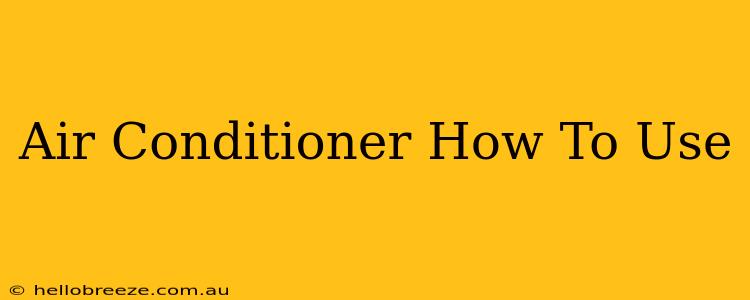Summer's heat can be unbearable, making your air conditioner an essential appliance. But are you using it to its full potential? Knowing how to properly operate your AC unit can significantly impact both your comfort and your energy bill. This guide will walk you through the essentials of air conditioner use, offering tips for optimal performance and energy savings.
Understanding Your Air Conditioner
Before diving into usage, it's crucial to understand your AC system's type. Common types include:
- Window units: These are compact and relatively inexpensive, ideal for single rooms.
- Portable units: Offering portability, they are suitable for various rooms but may be less efficient.
- Central air conditioning: This whole-home system is more complex but offers consistent cooling throughout your house.
- Ductless mini-splits: These systems offer zoned cooling, allowing you to control the temperature in specific areas.
Each type might have slightly different operating instructions, so always refer to your owner's manual for specific details.
How to Use Your Air Conditioner Effectively
Regardless of your AC type, these tips will maximize its efficiency and comfort:
1. Proper Installation and Maintenance
- Professional Installation: For central AC and mini-splits, professional installation is vital for optimal performance and safety. Improper installation can lead to reduced efficiency and potential damage.
- Regular Maintenance: Schedule annual maintenance checks. A clean filter and properly functioning condenser coils are crucial for efficient operation. Cleaning or replacing air filters every 1-3 months (depending on usage) is essential. Consider professional servicing for more in-depth cleaning.
2. Setting the Ideal Temperature
- Temperature Setting: The ideal temperature setting depends on personal preference, but aiming for 78°F (26°C) or higher when you're home and setting it higher when you're away can significantly reduce energy consumption. Remember that each degree you lower the thermostat increases energy use.
- Programmable Thermostats: Consider investing in a programmable or smart thermostat. These allow you to schedule temperature changes based on your daily routine, automatically adjusting temperatures when you're away or asleep, maximizing energy savings.
3. Optimizing Your Home for Cooling
- Insulation and Sealing: Proper insulation and sealing of windows and doors prevent cool air from escaping and warm air from entering. This significantly reduces the strain on your AC unit.
- Window Treatments: Using curtains or blinds can help block sunlight and reduce heat gain, lessening your AC's workload. Consider reflective window films for added insulation.
- Airflow: Ensure adequate airflow around your air conditioner. Keep vents clear of obstructions and maintain a clear path for air circulation.
4. Energy-Saving Habits
- Use Fans: Ceiling fans or portable fans can help circulate cool air, allowing you to raise your thermostat setting without sacrificing comfort.
- Limit Heat-Generating Appliances: Avoid using heat-generating appliances like ovens and dryers during peak heat hours.
- Close Doors and Vents: Keep doors and vents closed in rooms you are not using to prevent cooling those areas unnecessarily.
- Turn Off AC When Away: Always turn off your air conditioner when leaving the house for extended periods.
Troubleshooting Common Air Conditioner Problems
- Weak Airflow: This may indicate a clogged air filter, frozen evaporator coils, or restricted airflow. Check the filter, and if the issue persists, contact a professional.
- Unusual Noises: Clicking, rattling, or humming sounds could indicate a problem requiring professional attention.
- Leaking Water: Leaking water might be due to a clogged condensate drain line or a malfunctioning component. Contact a technician for repairs.
By following these guidelines, you can effectively utilize your air conditioner while minimizing energy waste and maximizing your comfort throughout the summer. Remember, regular maintenance is key to ensuring the longevity and efficiency of your AC system. If you encounter any significant issues, always consult a qualified HVAC technician.

